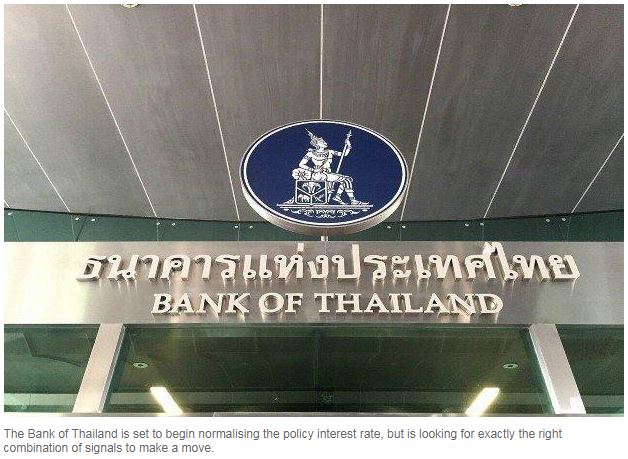Thailand: MPC details path to higher interest rate
The Bank of Thailand is set to begin raising the policy interest rate once economic growth and inflation move within their targets because financial vulnerabilities have started to become more widespread, in part because of the prolonged low interest rate.
“The Monetary Policy Committee [MPC] believes that should economic expansion continue and inflation move within its target range, the need to keep interest rates stable would gradually reduce,” said the MPC’s edited minutes released Wednesday.
The minutes also said the need to have a policy space to cushion against possible risks to future economic growth would increase.
The central bank will assess conditions based on data, focusing on evaluation of economic growth, inflation and financial stability risks.
On Nov 14, the seven-member rate-setting panel kept the policy rate unchanged at 1.5%, where it has stood since a 25-basis-point cut in April 2015, but three voted for a quarter-point increase, up from two votes at September’s meeting and one in August and June.
The growing discrepancy in monetary policy deliberation to a critical point adds to the likelihood that the first rate hike in more than seven years could occur at the MPC’s next meeting on Dec 19.
TMB Analytics maintains the view that the MPC will begin raising the policy interest rate by 25 basis points next month to uphold policy space against other major central banks, saying next year would be too late to implement a rate hike given the expected slowdown in GDP growth and exports.
The central bank forecasts GDP growth of 4.4% this year and 4.2% in 2019, with headline inflation projected at 1.1% for this year and next.
Thailand’s GDP rose by 4.3% year-on-year in the July-September period — the strongest in 18 quarters — after expanding by 3.8% in the second quarter and 3.3% in the first quarter.
The headline inflation rate, gauged by the increase in the consumer price index, rose for the 16th straight month in October but slowed from September as prices of raw food, vegetables and fruits dropped. Consumer prices rose 1.23% year-on-year last month, down from 1.33% logged in September.
Financial stability remains sound overall, but there is a need to monitor some pockets of risk that could pose vulnerabilities to financial stability in the future, the minutes said.
Search-for-yield behaviour still prevails amid the prolonged low-interest environment, evident in persistently high asset growth among savings cooperatives, as some of them have increasingly engaged in taking deposits and lending to other cooperatives, along with increased investment in both equities and debt instruments.
The MPC also discussed approaches to address and prevent systemic financial risks such as elevated household debt, rising competition in the mortgage loan market, expansion of saving cooperatives, debt-servicing ability among small and medium-sized enterprises and an acceleration in borrowing by large corporates.
Both the policy interest rate and macroprudential measures are necessary to address risks to financial stability, but macroprudential measures alone could not be employed in place of monetary policy, as they are “complementary measures to address pockets of risk”, the minutes said.
MPC members view Thailand’s economic conditions as sufficiently robust and unlikely to experience a significant slowdown, thus a gradual tightening of monetary policy will not substantially affect economic growth, the minutes said.
“Instead, it would reduce financial stability risks, which should help sustainable economic growth in the long term,” they said.
Source: https://www.bangkokpost.com/business/news/1584130/mpc-details-path-to-higher-interest-rate


 Thailand
Thailand




